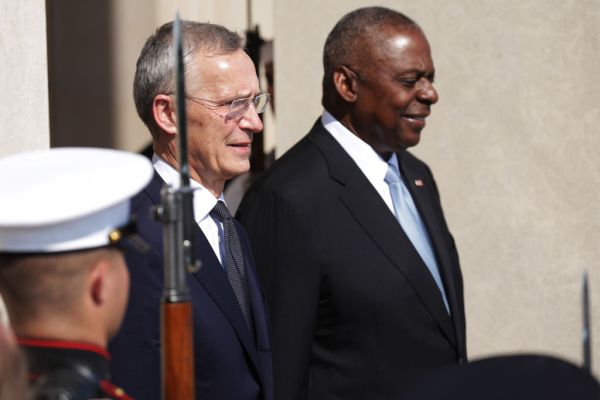President Joe Biden ran for office on a promise to reinvigorate America’s alliances. His administration has had some success, especially after Russia’s invasion of Ukraine. Yet the White House continues to miss opportunities, as the news coming out of Sweden and Italy this week shows.
Many in Western Europe see the U.S. as an unreliable partner, an old trend only exacerbated by the election of Donald Trump six years ago. Dangerous whispers of effectively “decoupling” from Washington still emanate from many continental capitals. The European Union’s attempt to centralize power in Brussels is often nothing more than a thinly veiled attack on U.S. policy—and in some cases American businesses interests.
Talk of creating a “European Amazon” or “European Google” are all bywords for asking how to kick the Americans out of the EU’s common market. Perhaps more sinister is the insistence on “strategic autonomy,” a euphemism for replacing NATO with an EU Army commanded from Brussels. And some of this has been more than talk—with disastrous real consequences: German suspicion about buying liquefied natural gas from the U.S. led to a disastrous reliance on Russian energy.
Heavily reliant on U.S. innovation and military power, there are limits to the appeal of anti-Americanism in Europe. But the transatlantic relationship remains vulnerable, and leaders in Washington would be wise to take every opportunity to fortify ties. Fortunately, two excellent opportunities have presented themselves in the continent’s north and south.
The recent Italian elections—won by the conservative Giorgia Meloni and her Fratelli d’Italia Party—could see the new government in Rome take a far warmer view of Washington than the Atlanto-agnostics who typically run the country.
Meloni has positioned her party as the most pro-Ukrainian political force in Italy, calling for tougher sanctions on Russia and more weapons to Kyiv. Aside from some rumblings from politically vulnerable coalition partners, it’s hard to distinguish her policy from Biden’s. And she has expressed interest in making Italy a more significant contributor and player in NATO.
To the north, the election of a center-right majority in the Swedish parliament also brings welcome news. On Monday center-right Moderate Party leader Ulf Kristersson was confirmed as the country’s new leader. Expect Sweden to double down on its commitment to re-arm and join NATO.
Aside from its commitment to transatlanticism, the center-right in Sweden has traditionally adopted a warmer stance to U.S. relations. By contrast, the traditionally dominant center-left Social Democrats have maintained residual anti-American sentiment.
The emergence of two more U.S.-friendly governments in Europe should be welcome news for the Biden administration. Yet, as it has with many countries in Central and Eastern Europe, the administration has been noticeably cooler toward the new parties in Italy and Sweden than less receptive governments in Berlin, Brussels, and Paris.
The silence from Biden on the election result in Italy has been deafening. While British Prime Minister Liz Truss and Polish Prime Minister Morawiecki were quick off the mark to congratulate her on her success, the White House remained silent. Praise from the U.S. has until now been solely from the other side, with congratulatory messages coming from major GOP figures like Sen. Ted Cruz and Florida Gov. Ron DeSantis.
Biden has spent half a century studying America’s relationship with Europe, but he appears slow to reassess the changing playing field. The Europe that existed during his time in the Senate, and as vice president, has vanished. The financial crisis redrew political boundaries and upset traditional norms. The war in Ukraine has had perhaps the most profound effect with the center of geopolitical power in Europe shifting from West to East: Berlin is now far less reliable than Warsaw, and Paris cannot be counted upon nearly as much as the Baltic capitals of Tallinn or Riga.
This matters beyond the war in Ukraine, because containing the spread of Chinese influence remains the biggest challenge for American interests. The EU’s largest two economies have consistently refused to recognize the threat from China. In 2021, attempts were made to pass a controversial “EU-China Investment Agreement,” which would have made it easier for Chinese companies to invest in Europe. The push was led by then-German Chancellor Angela Merkel and French President Emanuel Macron. While the agreement was put on ice by the European Commission after public backlash, talks have continued on a national level.
Next month Merkel’s successor in the chancellery, the Social Democrat Olaf Scholz, is set to become the first Western leader to visit China since the COVID-19 pandemic began. Macron is also said to be eyeing up a trip to Beijing in the coming months as he tries to soften ties. In both cases, these trips will run against U.S. foreign policy aims.
If Biden were more realistic, he would understand that he’ll have to look farther east in Europe to find partners who still believe American and European interests are intrinsically linked. Failing to do so will only see the United States weaker and more isolated at a time when it could be leading.








Please note that we at The Dispatch hold ourselves, our work, and our commenters to a higher standard than other places on the internet. We welcome comments that foster genuine debate or discussion—including comments critical of us or our work—but responses that include ad hominem attacks on fellow Dispatch members or are intended to stoke fear and anger may be moderated.